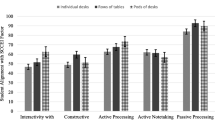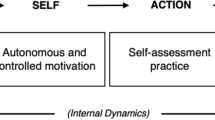Abstract
The First Principles of Instruction (FPI) represent ideologies found in most instructional design theories and models. Few attempts, however, have been made to empirically test the relationship of these FPI to instructional outcomes. This study addresses whether the degree to which FPI are implemented in courses makes a difference to student cognitive engagement, taking into account the mediating role of individual goals. A multilevel meditation model was tested with 1070 undergraduate students from 29 courses in a Korean university. Findings demonstrated that the influences of course-level implementation of FPI influence cognitive engagement through individual intrinsic goal orientation. Course-level implementation of FP does not directly affect surface strategy use and self-regulated strategy use; rather, the effect of FPI appears to be mediated by intrinsic goal orientations. Course-level implementation of FPI also appears to affect deep cognitive strategy use directly as well as indirectly through intrinsic goal orientation. The present study added novel evidence linking Merrill’s First Principles of Instruction to cognitive engagement.


Similar content being viewed by others
References
Ahlfeldt, S., Mehta, S., & Sellnow, T. (2005). Measurement and analysis of student engagement in university classes where varying levels of PBL methods of instruction are in use. Higher Education Research and Development, 24(1), 5–20.
Ames, C. (1992). Classrooms: Goals, structures, and student motivation. Journal of Educational Psychology, 84, 261–271.
Baron, R. M., & Kenny, D. A. (1986). The moderator-mediator variable distinction in social psychological research: Conceptual, strategic and statistical considerations. Journal of Personality and Social Psychology, 51, 1173–1182.
Church, M. A., Elliot, A. J., & Gable, S. L. (2001). Perceptions of classroom environment, achievement goals, and achievement outcomes. Journal of Educational Psychology, 93, 43–54.
Corno, L., & Mandinach, E. B. (1983). The role of cognitive engagement in classroom learning and motivation. Educational Psychologist, 18, 88–108.
Cropper, M. H., Bentley, J. P., & Schroder, K. (2009). How well do high-quality online courses employ Merrill’s first principles of instruction? In M. Orey, V. J. McClendon, & R. M. Branch (Eds.), Educational media and technology yearbook (Vol. 34). Breinigsville: Springer.
DeBacker, T. K., & Crowson, H. M. (2006). Influences on cognitive engagement: Epistemological beliefs and need for closure. British Journal of Educational Psychology, 76, 535–551.
Dupeyrat, C., & Mariné, C. (2005). Implicit theories of intelligence, goal orientation, cognitive engagement, and achievement: A test of Dweck’s model with returning to school adults. Contemporary Educational Psychology, 30, 43–59.
Eley, M. (1992). Differential adoption of study approaches within individual students. Higher Education, 23, 231–254.
Fredricks, J. A., Blumenfeld, P. C., & Paris, A. H. (2004). School engagement: Potential of the concepts, state of the evidence. Review of Educational Research, 74(1), 59–109.
Frick, T. W., Chadha, R., Watson, C., Wang, Y., & Green, P. (2008). Theory-based course evaluation: Implication for improving student success in postsecondary education. Paper presented at American Educational Research association, New York.
Frick, T. W., Chadha, R., Watson, C., Wang, Y., & Green, P. (2009). College student perceptions of teaching and learning quality. Educational Technology Research and Development, 57, 705–720.
Frick, T. W., Chadha, R., Watson, C., & Zlatkovska, E. (2010). Improving course evaluations to improve instruction and complex learning in higher education. Educational Technology Research and Development, 58, 115–136.
Gardner, J. (2011). Testing the efficacy of Merrill’s First Principles of Instruction in improving student performance in introductory biology courses. Unpublished doctoral dissertation. Utah State University, Logan, Utah.
Greene, B. A., & Miller, R. B. (1996). Influences on course performance: Goals, perceived ability, and self-regulation. Contemporary Educational Psychology, 21(2), 181–192.
Hox, J. J. (1995). Applied multilevel analysis. Amsterdam: TT publicaties.
Jang, H., Reeve, J., & Deci, E. L. (2010). Engaging students in learning activities: It is not autonomy support or structure but autonomy support and structure. Journal of Educational Psychology, 10(3), 588–600.
Kim, Y., & Jung, H. (2013). Design and effectiveness of the face-to-face instruction applying Merrill’s first principles of instruction. Journal of Educational Technology, 29(3), 599–637.
Klein, R. B. (2005). Principles and practices of structural equation modeling (2nd ed.). New York: The Guilford Press.
Koszalka, T., Song, H., & Grabowski, B. (2002). Examining learning environmental design issues for prompting reflective thinking in web-enhanced PBL. Paper presented at the meeting of the American Educational Research Association, New Orleans, LA.
Krull, J. L., & MacKinnon, D. P. (2001). Multilevel modeling of individual and group level mediated effects. Multivariate Behavioral Research, 36, 249–277.
Kyndt, E., Dochy, F., Struyven, K., & Cascallar, E. (2011). The direct and indirect effect of motivation for learning on students’ approaches to learning through the perceptions of workload and task complexity. Higher Education Research and Development, 30(2), 135–150.
Lyke, J. A., & Young, A. J. K. (2006). Cognition in context: Students’ perceptions of classroom goal structures and reported cognitive strategy use in the college classroom. Research in Higher Education, 47(4), 477–490.
Margaryan, A., Bianco, M., & Littlejohn, A. (2015). Instructional quality of massive open online courses (MOOCs). Computer and Education, 80, 77–83.
Meece, J., Blumenfeld, P. C., & Hoyle, R. (1988). Students’ goal orientations and cognitive engagement in classroom activities. Journal of Educational Psychology, 80, 514–523.
Meece, J. L., Herman, P., & McCombs, B. L. (2003). Relations of learner-centered teaching practices to adolescents’ achievement goals. International Journal of Educational Research, 39, 457–475.
Merrill, M. D. (2002). First principles of instruction. Educational Technology Research and Development, 50(3), 43–59.
Merrill, M. D. (2008). Why basic principles of instruction must be present in the learning landscape, whatever form it takes, for learning to be effective, efficient and engaging. In J. Visser & M. VisserValfrey (Eds.), Learners in a changing learning landscape: Reflections from a dialogue on new roles and expectations (pp. 267–275). New York: Springer.
Merrill, M. D. (2009). First Principles of Instruction. In C. M. Reigeluth & A. Carr (Eds.), Instructional design theories and models: Building a common knowledge base (Vol. III). New York: Routledge Publishers.
Nie, Y., & Lau, S. (2010). Differential relations of traditional and constructivist instruction to students’ cognition, motivation, and achievement. Learning and Instruction, 20, 411–423.
Nijhuis, J., Segers, M., & Gijselaers, W. (2005). Influence of redesigning a learning environment on student perceptions and learning strategies. Learning Environments Research, 8, 67–93.
Nijhuis, J., Segers, M., & Gijselaers, W. (2007). The interplay of perceptions of the learning environment, personality and learning strategies: A study amongst International Business Studies students. Studies in Higher Education, 32(1), 59–78.
Nijhuis, J., Segers, M., & Gijselaers, W. (2008). The extent of variability of learning strategies and students’ perceptions of the learning environment. Learning and instruction., 18, 121–134.
Paris, S. G., & Paris, A. H. (2001). Classroom applications of research on self-regulated learning. Educational Psychologist, 36, 89–101.
Pintrich, P. R. (2004). A conceptual framework for assessing motivation and self-regulated learning in college students. Educational Psychology Review, 16, 385–407.
Pintrich, P. R., Conley, A. M., & Kempler, T. M. (2003). Current issues in achievement goal theory and research. International Journal of Educational Research, 39, 319–337.
Pintrich, P. R., & De Groot, E. V. (1990). Motivational and self-regulated learning component of classroom academic performance. Journal of Educational Psychology, 82, 33–40.
Pintrich, P. R., & Garcia, T. (1991). Student goal orientation and self-regulation in the college classroom. In M. L. Maehr & P. R. Pintrich (Eds.), Advances in motivation and achievement (Vol. 7, pp. 371–402). Greenwich CT: JAI Press.
Pintrich, P. R., Roeser, R. W., & De Groot, E. A. M. (1994). Classroom and individual differences in early adolescents’ motivation and self-regulated learning. Journal of Early Adolescence, 14(2), 139–161.
Pintrich, P. R., & Schrauben, B. (1992). Student’s motivational beliefs and their cognitive engagement in classroom academic tasks. In D. Schunk & J. Meece (Eds.), Student perceptions in the classroom: Causes and consequences (pp. 149–183). Hillsdale: Lawrence Erlbaum.
Pintrich, P. R., Smith, D. A. F., Garcia, T., & McKeachie, W. J. (1991). A manual for the use of the Motivated Strategies for Learning Questionnaire (MSLQ). Ann Arbor: University of Michigan, National Center for Research to Improve Postsecondary Teaching and Learning.
Raudenbush, S. W., & Bryk, A. S. (2002). Hierarchical linear models: Applications and data analysis methods (2nd ed.). Newbury Park: Sage.
Reigeluth, C. M., & Carr-Chellman, A. A. (2009). Understanding instructional theory. In C. M. Reigeluth & A. A. Carr-Chellman (Eds.), Instructional-design theories and models: Building a common knowledge base (Vol. III, pp. 3–26). New York: Routledge.
Rotgans, J., & Schmidt, H. (2011). Cognitive engagement in the problem-based learning classroom. Advances in Health Sciences Education, 16(4), 465–479.
Rucker, D. D., Preacher, K. J., Tormala, Z. L., & Petty, R. E. (2011). Mediation analysis in social psychology: Current practices and new recommendations. Social and Personality Psychology Compass, 5(6), 359–371.
Trigwell, K., & Prosser, M. (1991). Improving the quality of student learning: the influence of learning context and student approaches to learning on learning outcomes. Higher Education, 22, 251–266.
van Merriënboer, J. J. G., Clark, R. E., & de Croock, M. B. M. (2002). Blueprints for complex learning: The 4C/ID model. Educational Technology Research and Development, 50(2), 39–64.
Vermetten, Y., Vermunt, J., & Lodewijks, H. (2002). Powerful learning environment? How do university students differ in their response to instructional measures. Learning and Instruction, 12, 263–284.
Walker, C. O., Breene, B., & Mansell, R. A. (2006). Identification with academics, intrinsic/extrinsic motivation, and self-efficacy as predictors of cognitive engagement. Leaning and Individual differences, 16, 1–12.
Wilson, K., & Fowler, J. (2005). Assessing the impact of learning environments on students’ approaches to learning: Comparing conventional and action learning designs. Assessment and Evaluation in Higher Education, 30(1), 87–101.
Wolters, C. (2004). Advancing achievement goal theory: Using goal structure and goal orientation to predict students’ motivation, cognition, and achievement. Journal of Educational Psychology, 96, 236–250.
Wolters, C., & Pintrich, P. R. (1998). Contextual differences in student motivation and self-regulated learning in mathematics, English, and social studies classrooms. Instructional Science, 26, 27–47.
Zepke, N. (2014). Student engagement research in higher education: Questioning an academic orthodoxy. Teaching in Higher Education, 19(6), 697–708.
Zhang, Z., Zyphur, M. J., & Preacher, K. J. (2009). Testing multilevel mediation using hierarchical linear models: Problems and solutions. Organizational Research Methods, 12, 695–719.
Zusho, A., & Pintirich, P. R. (2003). Skill and will: The role of motivation and cognition in the learning of college chemistry. International Journal of Science Education, 25, 1081–1094.
Author information
Authors and Affiliations
Corresponding author
Rights and permissions
About this article
Cite this article
Lee, S., Koszalka, T.A. Course-level implementation of First Principles, goal orientations, and cognitive engagement: a multilevel mediation model. Asia Pacific Educ. Rev. 17, 365–375 (2016). https://doi.org/10.1007/s12564-016-9431-z
Received:
Revised:
Accepted:
Published:
Issue Date:
DOI: https://doi.org/10.1007/s12564-016-9431-z




